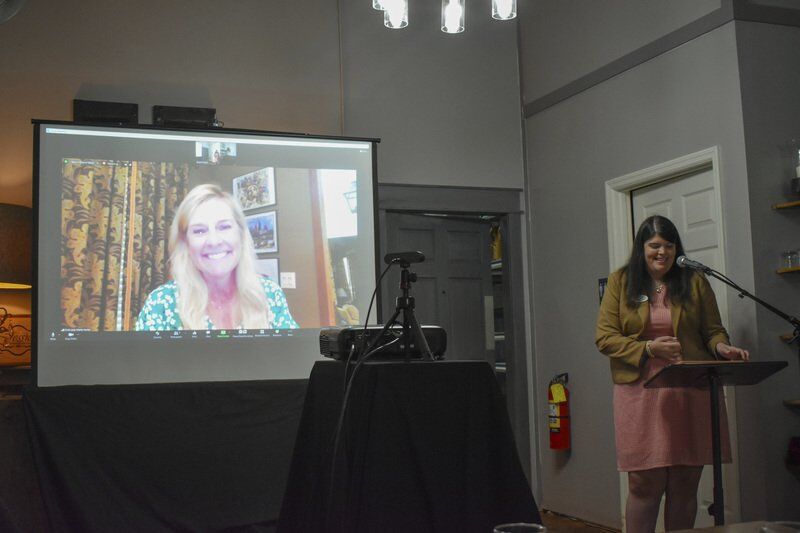Georgia first lady discusses human trafficking at women’s luncheon
Published 11:00 am Friday, April 2, 2021

- Bryce Ethridge | The Valdosta Daily TimesGeorgia First Lady Marty Kemp, on screen, and Chamber President Christie Moore speak to women gathered at Jessie's Restaurant and Catering about human trafficking. Human trafficking affects all 159 of the state's counties, Kemp said.
VALDOSTA – The Valdosta-Lowndes County Chamber of Commerce brought together women from across South Georgia to discuss the fight against human trafficking, with Georgia First Lady Marty Kemp as guest speaker.
Kemp had been scheduled to speak in person but the First Lady and Gov. Brian Kemp were quarantined this past week after coming in contact with COVID-19. The governor had been scheduled to visit Wild Adventures Theme Park. Marty Kemp spoke via teleconference during the luncheon.
The group reviewed how they could spot someone being trafficked. The short answer: it’s not easy to tell.
Chamber President Christie Moore participated in a human trafficking lecture a few years ago. She said just about everyone has a preconceived notion of what a victim of trafficking looks like.
“You’ll picture human trafficking, the women and male victims, to be different than you,” she said. “We might have a stereotype of what they look like, how old they are, where they’re from , what kind of family they’re from – they didn’t grow up with two parents – whatever it is.”
In reality, the victims have life experiences much like everyone else, she said. The bottom line: It could happen to anyone.
Kemp said this is why education and training are key. She referenced how Delta Air Lines trains flight attendants with a human trafficking module. The training helped two employees, who decided to go to a Florida McDonald’s, save two girls from being trafficked.
“(It) was something they felt like was straight out of their training–they had a gut feeling, contacted the police, the car had been stolen and (the girls) were in harm’s way,” Kemp said.
Imagine saving someone’s life from this horrific industry, she said, it would be amazing.
The threat is real, according to Kemp; reports show human trafficking is present in 146 of Georgia’s 159 counties.
“Just by what I’ve learned about the state, it’s in 159 counties,” she said. “We just haven’t been able to recognize it.”
The Georgia Department of Administrative Services has formed an educational presentation on the issue for the public to view on the governor’s website, http://doas.ga.gov/human-resources-administration/human-trafficking-awareness/human-trafficking-awareness-training.
It teaches people the warning signs. Kemp encouraged everyone to share it within their work places.
Moore said the chamber and its staff are committed to watching the human trafficking training.
“We encourage all local businesses, organizations and governments to do so as well,” she said.
While residents do their part, Kemp said the government will do its part.
On that front, the state already has, with Senate Bills 393, 435 and 823.
The bills, now law, allow district attorneys to request the Georgia Bureau of Investigation to help prosecute crimes related to sex trafficking and gangs; creates ways for victims to have prior convictions vacated if they were charged while they were a victim of human trafficking; and bars anyone convicted of human trafficking from getting a commercial driver’s license if their conviction involved driving a commercial vehicle, respectively.
They were passed in early 2020.
In February 2021, Georgia passed Senate Bills 33 and 34 which allow victims or state officials to file civil lawsuits seeking money damages against traffickers and make it easier for people who have been trafficking victims to change their names respectively.
Statistics, Kemp said, show 50% of victims are trafficked by family members and their average age is between 12-14 years old.
This is one reason, Kemp said, the state is trying to get kids back into school – in case something is happening at home, perhaps teachers could catch it.
The floor was opened for questions and discussion.
Michelle Girtman, executive director of the Haven, asked how domestic abuse shelters can provide a place for trafficking victims who cannot go home.
“What do you see as the future of bringing domestic violence shelters to the table to bridge the gaps and barriers and to form partnerships?” Girtman asked.
Kemp said, “Housing is one of our biggest issues.” With Girtman offering the domestic abuse shelters as additional housing, Kemp said she’ll look into how they can do that with the Grace Commission.
Vanassa Flucas, Valdosta neighborhood development director, asked what will the state be doing to make sure these human trafficking resources – the training, physical and mental health assistance, notice of decriminalization bills – reach low-income areas?
Kemp said she’ll be looking into ways to help, but for now, they’ll be focused on relaying this information to organizations that are already working in human trafficking recovery.
“I hope that they will be reaching out, as well, to their communities to get their information out and just continue to talk about it,” Kemp said. “We’ll follow up with that and I’ll get the team to follow up with you on that as well.”
Making the information public requires a team effort, Moore said, so it’s something the community can work on together.
“These are hard conversations to have,” Moore said. “It’s not something you have at your local basketball game, but I think they’re important conversations – I know they’re important conversations.”




